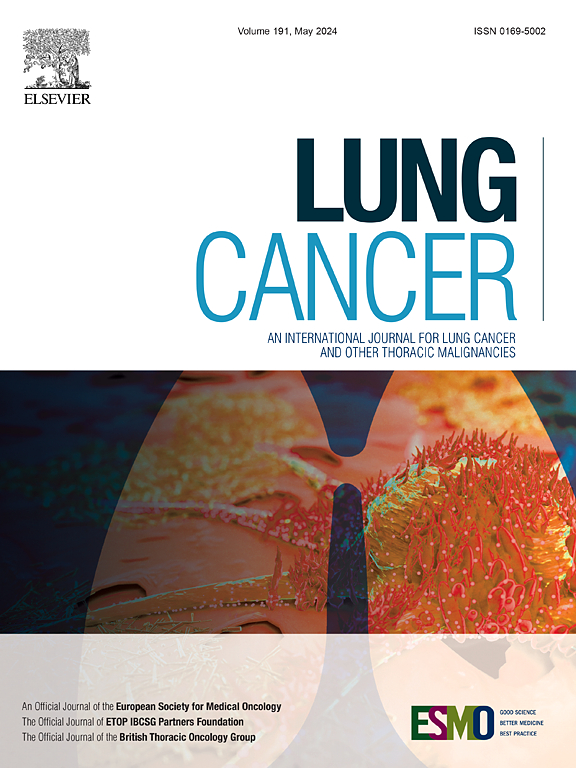Evaluating the prognostic impact of EGFR mutation on adjuvant chemotherapy efficacy in grade 3 stage IB lung adenocarcinoma
IF 4.5
2区 医学
Q1 ONCOLOGY
引用次数: 0
Abstract
Objectives
Adjuvant chemotherapy (ACT) for patients with stage IB lung adenocarcinoma (LUAD) is controversial, particularly in those with epidermal growth factor receptor (EGFR) mutations. This study aims to evaluate the efficacy of ACT in stage IB LUAD with Grade 3 and explore the prognostic impact of EGFR mutations status on chemotherapy effectiveness.
Methods
We identified 707 high-risk (Grade 3) stage IB LUAD patients who underwent complete resection between 2014 and 2018. The Kaplan-Meier curves was used to assess recurrence-free survival (RFS) and overall survival (OS). Prognostic factors were evaluated using the Cox proportional hazards model, and propensity score matching was applied to reduce bias from confounding variables.
Results
In the entire cohort, patients who received ACT showed significantly better 5-year RFS and OS compared to those who did not (P < 0.001 for both). Among 247 patients without EGFR mutations, 125 (50.6 %) received ACT and 122 (49.4 %) did not. In the propensity score-matched cohort of 84 pairs, those treated with ACT had significantly better 5-year RFS and OS (P < 0.01 for both). Among 460 patients with EGFR mutations, 237 (51.5 %) received ACT and 223 (48.5 %) did not. In the matched cohort of 184 pairs, ACT recipients had significantly better prognoses. Multivariable analysis confirmed ACT was an independent prognostic factor, while EGFR mutation status was not.
Conclusions
ACT significantly improves the prognosis of patients with Grade 3 stage IB LUAD, irrespective of EGFR mutation status. These findings support the clinical adoption of ACT for this patient subgroup.
评估EGFR突变对3级IB期肺腺癌辅助化疗疗效的预后影响
目的IB期肺腺癌(LUAD)患者的辅助化疗(ACT)是有争议的,特别是那些表皮生长因子受体(EGFR)突变的患者。本研究旨在评估ACT在IB期3级LUAD中的疗效,并探讨EGFR突变状态对化疗效果的预后影响。方法:选取了707例2014年至2018年间接受全切除术的高危(3级)IB期LUAD患者。Kaplan-Meier曲线用于评估无复发生存(RFS)和总生存(OS)。使用Cox比例风险模型评估预后因素,并采用倾向评分匹配来减少混杂变量的偏差。结果在整个队列中,接受ACT治疗的患者的5年RFS和OS明显优于未接受ACT治疗的患者(P <;两者均为0.001)。在247例没有EGFR突变的患者中,125例(50.6%)接受了ACT治疗,122例(49.4%)未接受ACT治疗。在84对倾向评分匹配的队列中,接受ACT治疗的患者具有显著更好的5年RFS和OS (P <;两者均为0.01)。在460例EGFR突变患者中,237例(51.5%)接受了ACT治疗,223例(48.5%)未接受ACT治疗。在184对配对队列中,ACT接受者的预后明显更好。多变量分析证实ACT是一个独立的预后因素,而EGFR突变状态不是。结论:与EGFR突变状态无关,act可显著改善3级IB期LUAD患者的预后。这些发现支持临床采用ACT治疗这一患者亚组。
本文章由计算机程序翻译,如有差异,请以英文原文为准。
求助全文
约1分钟内获得全文
求助全文
来源期刊

Lung Cancer
医学-呼吸系统
CiteScore
9.40
自引率
3.80%
发文量
407
审稿时长
25 days
期刊介绍:
Lung Cancer is an international publication covering the clinical, translational and basic science of malignancies of the lung and chest region.Original research articles, early reports, review articles, editorials and correspondence covering the prevention, epidemiology and etiology, basic biology, pathology, clinical assessment, surgery, chemotherapy, radiotherapy, combined treatment modalities, other treatment modalities and outcomes of lung cancer are welcome.
 求助内容:
求助内容: 应助结果提醒方式:
应助结果提醒方式:


